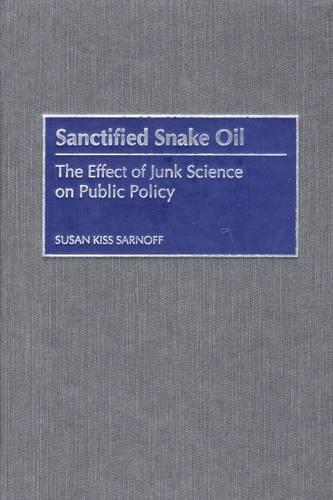
Sanctified Snake Oil: The Effect of Junk Science on Public Policy
(Hardback)
Publishing Details
Sanctified Snake Oil: The Effect of Junk Science on Public Policy
By (Author) Susan K. Sarnoff
Bloomsbury Publishing PLC
Praeger Publishers Inc
30th March 2001
United States
Classifications
Tertiary Education
Non Fiction
Central / national / federal government policies
Social welfare, social policy and social services
320.6
Physical Properties
Hardback
248
Description
Government supported junk social science-or sanctified snake oil as Sarnoff terms it-exists in all policy arenas along the entire political spectrum, as policy advocates seek to justify the continuation of ineffective programs and to block alternative solutions. This form of junk science is particularly dangerous and wasteful in terms of tax dollars because professional confirmation, media investigation and government support lend it an unwarranted imprimatur of validity. Sarnoff argues that it confuses the public and convinces them to support programs as ends in themselves, rather than determining whether or not such efforts actually achieve purported goals. Ineffectiveness, incompetence, lack of technology, ideology masquerading as policy, and even outright fraud serve to perpetuate the general confusion. This situation is exacerbated by the proliferation of media attention, much of it unmonitored for accuracy or bias. Sanctified snake oil, Sarnoff contends, spawns industries that drain public resources and attention from real, serious cases and distort public perceptions of the magnitude of the issues involved. This study sheds new light on this muddle and offers recommendations which will make it more difficult for junk science to represent itself as legitimate social policy.
Reviews
"[T]his volume promises to be the most controversial and must-read book since Specht and Courtney's Unfaithful Angels: How Social Work Has Lost Its Mission hit the shelves. No, this is not your typical academic book, it is original, dynamic and very thought-provoking.... Sanctified Snake Oil is a compelling and fascinating work which would make an excellent addition to any graduate research or women's studies course or book club discussion group."-Katherine van Wormer Professor of Social Work University of Northern Iowa Coauthor of Women and the Criminal Justice System
"The snake oil deal with in the private sphere is bad enough, but when the government endorses junk sciences, and not just in the court of public opinion but in actual courts of law, we need to stand up and fight back, as Susan Sarnoff has done in this brilliant tour de force of skeptical analysis. Sanctified Snake Oil should be read by every member of congress, as well as law makers throughout the land."-Michael Shermer Publisher Skeptics Society and Skeptic Magazine
"Thomas Sowell says that social' is an adjective whose function is to negate the noun it modifies, and too much social science' seems to confirm that insight. Susan Sarnoff has compiled a frightening dossier of junk social science, with even more disturbing evidence about the role of government and the media in supporting junk science. Few readers will comfortably accept Sarnoff's argument in every case, but anyone concerned with social science and public policy should think carefully about the evidence she presents."-David Boaz Executive Vice President Cato Institute Author of Libertarianism: A Primer
.,."this work raises valid questions regarding the accuracy and validity of the data and research on which policy decisions are often based. Recommended for upper-division undergraduates and above."-Choice
...this work raises valid questions regarding the accuracy and validity of the data and research on which policy decisions are often based. Recommended for upper-division undergraduates and above.-Choice
..."this work raises valid questions regarding the accuracy and validity of the data and research on which policy decisions are often based. Recommended for upper-division undergraduates and above."-Choice
Author Bio
SUSAN KISS SARNOFF is an Assistant Professor of Social Work at Ohio University. She specializes in teaching Social Policy and in analyzing government bureaucracies, public and private benefits, and criminal justice policy. She is the author of Paying for Crime: The Policies and Possibilities of Crime Victim Reimbursement (Praeger, 1996), and is currently conducting research on social work regulation and ethics.
